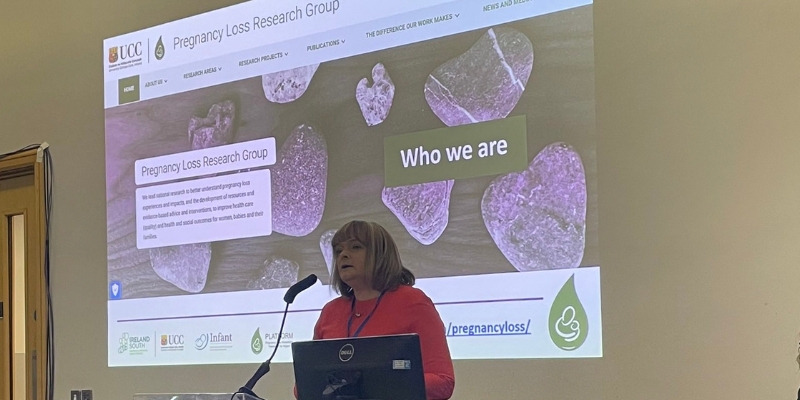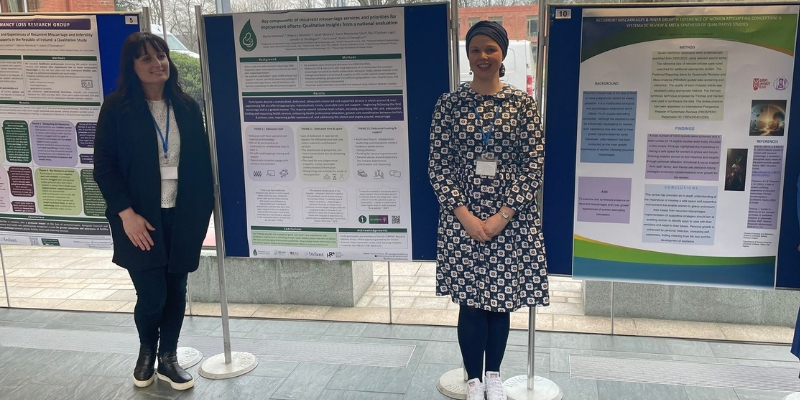News and media
Latest research in recurrent pregnancy loss presented at Queen’s University Belfast

The Advances in Recurrent Pregnancy Loss and Extreme Pre-term Birth Conference was held at Riddel Hall, Queen’s University Belfast (and online) on Friday 08 March 2024. The conference featured world-leading researchers and clinicians from the UK, Ireland and Europe, discussing the latest research in recurrent pregnancy loss and extreme pre-term birth.
Professor Keelin O’Donoghue provided an overview of findings of the Health Research Board-funded RE:CURRENT Project – a national evaluation of recurrent miscarriage services in the Republic of Ireland – on behalf of the RE:CURRENT Team.
She brought delegates through the various studies conducted, including:
- A systematic review of clinical practice guidelines
- Developing guideline-based key performance indicators for recurrent miscarriage care
- A national evaluation of recurrent miscarriage care services using guideline-based key performance indicators
- A qualitative exploration of the views of people with professional or lived experience on how we define recurrent miscarriage
- National care experience survey
- Experiences of recurrent miscarriage care during the initial phases of COVID-19 in Ireland
- Stakeholder perspectives on recurrent miscarriage services and improvement priorities.
She proposed model of care based on the findings which provides support for a graded approach to miscarriage care, starting from the first miscarriage. This has been presented to the National Women and Infants Health Programme, Health Service Executive, and the Women’s Health Taskforce at the Department of Health.
Alongside the proposed model of care, Professor O’Donoghue stressed the need for:
- Prioritisation and standardisation of recurrent miscarriage care
- Dedicated funding and resources (clinics, staff, time, spaces)
- Enhanced supportive care and informational support for women and men/partners with recurrent miscarriage
- Greater care coordination/engagement between tertiary and community care
- Enhanced education/training and support for health professionals
- Improved public awareness, which requires addressing the silence and stigma around miscarriage.
Professor O’Donoghue also highlighted knowledge translation activities undertaken as part of the project, including media activities as well as the development of a range of resources such as:
- National information booklets about miscarriage and recurrent miscarriage
- Updated online information via corkmiscarriage.com
- Case studies of hospital spaces which support good bereavement care
- Checklist for emergency department staff to support telephone conversations with women around miscarriage
- A pre-appointment letter template for recurrent miscarriage/pregnancy loss clinics
- Multi-lingual videos on recurrent miscarriage.
A national clinical practice guideline for recurrent miscarriage has also been produced, led by Dr Laura Linehan.
Dr Aine Aventin (Queen’s University Belfast) spoke about pregnancy loss and maternal mental health, outlining work from her team and implications for health professionals. In particular, she discussed poor care experiences in Northern Ireland documented through surveys and interviews with women, the importance of acknowledging grief, and how to provide compassionate care.
Before lunch, Dr Ciara Daly (Ulster Hospital) presented a case of chronic histiocytic intervillositis (CHI) managed in collaboration with Professor Alexander Heazell (Manchester University). Professor Heazell then outlined research on CHI and other recurrent placental lesions. He discussed the importance of pattern recognition and expert opinion, that CHI should not be dismissed as a one-off event as chances of recurrence are high, and that CHI is not detectable antenatally. The importance of perinatal pathology was highlighted.
Rachel Small, Clinical Matron, and Chair of the Association of Early Pregnancy Units, spoke about their nurse-led recurrent miscarriage clinic at University Hospital Birmingham, including her experience in setting up and running this clinic.
In the afternoon, Dr Lisa Story (King’s College London) presented on advances in detection and prevention of extreme pre-term birth. Professor Siobhan Quenby (University of Warwick) brought us through recent advances in recurrent pregnancy loss focusing on research underpining clinical guidelines, the Lancet Series: Miscarriage Matters, and why “every miscarriage matters”.
During the final session of the day, Dr Meena Choudhary (Newcastle Fertility Centre) focused on recurrent pregnancy loss and genomics, followed by Professor Henriette Svarre Nielsen (University of Copenhagen) who – presently remotely from Oslo – spoke about cell-free fetal DNA and hydroxycholorquine and their potential uses in recurrent pregnancy loss.
Congratulations to Dr Laura Linehan and Marita Hennessy PhD who were jointly awarded the RPLEPB Poster Prize. Laura’s poster explored ‘Views and experiences of recurrent miscarriage and infertility care in the Republic of Ireland: A qualitative study’. Marita’s poster, presented on behalf of the RE:CURRENT Team, was titled ‘Key components of recurrent miscarriage services and priorities for improvement efforts: Qualitative insights from a national evaluation’.
The event was well-attended, with over 150 people registering to attend in-person and online. It was a wonderful opportunity learn and network with clinicians and researchers with shared interests in enhancing care and outcomes for people who experience recurrent miscarriage and extreme pre-term birth.
Many thanks to all involved in organising this event, particularly Dr Johnny White, Dr Rachel McClelland, Dr Susie Finnegan, Dr Caroline Bryson, and Dr David Hunter. We look forward to strengthening collaborations in pregnancy loss research and practice across the island of Ireland.

Dr Laura Linehan (Specialist Registrar, Cork University Maternity Hospital and PhD Student) and Marita Hennessy PhD (Postdoctoral Researcher)


